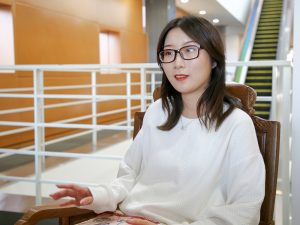If learning a foreign language is on your New Year Resolution List, then you’ve come to the right place. Apart from courses in English, Chinese, and Portuguese, the three most commonly spoken languages in Macao, UM also offers courses in a variety of other languages, such as French, Spanish, German, and Japanese. In this issue, we interview four students who are learning different languages. They share with us how studying at UM helps them develop an interest in language.
French: A Romantic Language
Many people know English to be an international language. But did you know French is also an international language? French is used by nearly 300 million people in the world. Moreover, French and English were selected as the ‘working languages’ at the United Nations. Angel Ji, a second-year student in the Department of Accounting and Information Management, is currently studying an elementary course in French. She has never learned French before, but has heard many people say that France is the most romantic country in the world and French is the most beautiful language.
For Ji, pronunciation is the most interesting yet difficult part of learning French. She says, ‘French and English are very different in this respect. When you first hear French words, you find them fun and interesting, but when you try to pronounce them, you will find it very difficult.’
She is working hard to overcome this challenge. Apart from being an attentive student in class, she has found a French-learning website to practice listening and speaking. She also watches French films to acquaint herself with French culture.
French is the official language in more than 20 countries around the world. Ji appreciates the many opportunities for overseas exchange programmes UM provides for students and hopes that her knowledge of French will be helpful for when she studies in a French-speaking country.
The Challenge of Learning German
German is another popular choice among UM students. Frida Wu, a third-year student in the Department of Economics, developed a strong interest in German football, architecture, culture, and customs in high school. Before joining UM, she already studied online German courses for beginners. Recently, she enrolled herself in an elementary German course at UM.
Wu says German word order is painfully complicated because the verb is the only word with a fixed position in a sentence. This creates an enormous challenge, which motivates her to devote more time and energy to studying grammar.
Many German words come from other languages such as English. Although these loan words retain the same spellings, they are pronounced very differently than in the original languages. To make matters worse, some German words are pronounced differently in different contexts, with no set rules to follow. To develop a feel for the language, Wu tries to create an environment that is conducive to language learning. For instance, she listens to German songs and watches German films in order to learn word usage within context.
German is spoken by nearly 100 million people in the world, and it is the official language in six European countries. Before learning German at UM, Wu visited three of these countries, namely Germany , Switzerland, and Fürstentum Liechtenstein. ‘It’ s a pity that I could only communicate with the locals in English back then,’ she says. ‘I hope when I visit other German-speaking countries such as Austria, I will be able to have simple conversations with the locals in German.’
A Good Spanish Teacher
Claire Zhao is a fourth-year Chinese education major in the Faculty of Education and a member of Chao Kuang Piu College. She has taken multiple language courses at UM, including courses in German, Portuguese, French, and Spanish. Of the four languages, the one that most interests her is Spanish, which she has been studying for three semesters.
Spanish is spoken by more than 500 million people around the world. In terms of the number of native speakers, it is second only to Mandarin. It is the main language used in about 20 countries, including Spain, Mexico, and Argentina. Interestingly, what drove Zhao to learn the language was not its practical use, but her desire to better understand the Spanish songs of her favourite singer Sarah Brightman. ‘She is from the United Kingdom, but she has sung many beautiful Spanish songs. In order to better understand her songs, I told myself that I simply must learn Spanish,’ she says.
Interest goes a long way in language learning, but having a good teacher is equally important. Zhao feels most fortunate that she has such a teacher , Nuno. ‘Nuno always upload the learning materials to UM Moodle before a class. In class, he goes through the learning materials while highlighting and explaining the key points for us,’ says Zhao. According to Zhao, the best thing about Nuno’ s class is teacher-student interaction. Nuno often divides students into several groups and assigns a different topic to each group for discussion. He himself also participates in these group discussions. ‘This kind of communication allows us to practice what we have learned, thereby helping us gain a better understanding of the knowledge,’ says Zhao.
Under Nuno’s patient guidance, Zhao became more and more confident in her ability to learn Spanish. She plans to continue with Spanish studies after graduating from UM, hopefully through teaching Chinese to children in Spanish speaking countries. ‘If my wish comes true, I will be able to gain a deeper understanding of Spanish culture and promote Chinese culture at the same time,’ she says.
Strong Interest in Learning Japanese
UM’s Centre for Japanese Studies offers a bachelor ’s degree in Japanese studies for Japanese-major students and Japanese language courses for students from other departments. Coral Liu, a third-year student in the Department of Mathematics, is one such student. Liu says she decided to learn Japanese for a simple reason: to prepare for when she visits Japan as a tourist. But now she realises that proficiency in Japanese will likely give her a competitive edge on the job market, given the increasing trade cooperation between China and Japan.
In class, her teacher explains Japanese culture as well as the different communication styles of Japanese and Chinese. Today, when she comes across a Japanese student on campus, she can only communicate in English or talk in simple Japanese phrases. ‘But I have a strong interest in learning Japanese, so I will keep learning,’she says.
Source: My UM ISSUE 95

UM students send New Year greetings in different languages

UM is where Angel Ji started learning French

Frida Wu developed an interest in German culture in high school. She is currently learning German.

Claire Zhao has been studying Spanish for three semesters at UM

Coral Liu believes proficiency in Japanese will give her a competitive edge
